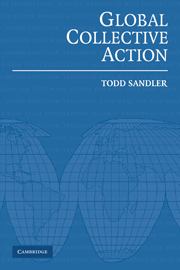Book contents
- Frontmatter
- Contents
- Tables and Figures
- Preface
- 1 Future Perfect
- 2 “With a Little Help from My Friends”: Principles of Collective Action
- 3 Absence of Invisibility: Market Failures
- 4 Transnational Public Goods: Financing and Institutions
- 5 Global Health
- 6 What to Try Next? Foreign Aid Quagmire
- 7 Rogues and Bandits: Who Bells the Cat?
- 8 Terrorism: 9/11 and Its Aftermath
- 9 Citizen against Citizen
- 10 Tales of Two Collectives: Atmospheric Pollution
- 11 The Final Frontier
- 12 Future Conditional
- References
- Author Index
- Subject Index
12 - Future Conditional
Published online by Cambridge University Press: 19 January 2010
- Frontmatter
- Contents
- Tables and Figures
- Preface
- 1 Future Perfect
- 2 “With a Little Help from My Friends”: Principles of Collective Action
- 3 Absence of Invisibility: Market Failures
- 4 Transnational Public Goods: Financing and Institutions
- 5 Global Health
- 6 What to Try Next? Foreign Aid Quagmire
- 7 Rogues and Bandits: Who Bells the Cat?
- 8 Terrorism: 9/11 and Its Aftermath
- 9 Citizen against Citizen
- 10 Tales of Two Collectives: Atmospheric Pollution
- 11 The Final Frontier
- 12 Future Conditional
- References
- Author Index
- Subject Index
Summary
In 2000, I made a career change when I accepted an endowed chair in the School of International Relations (SIR) at the University of Southern California. Although I still have an appointment in economics, my primary affiliation and responsibilities are in international relations, an ideal discipline to apply my economic methods to the study of international policy. My efforts to focus on international political economy meant my return to the roots of economics as embodied in the works of Adam Smith, David Ricardo, Thomas Robert Malthus, and the other founders of economics. Since joining SIR, I have discovered from my colleagues that my characterization of agents as rational actors who seek their best outcome subject to constraints is a realist approach. The application of non cooperative game theory to understand nations' actions also follows this tradition. My view that nations will remain the main agents in addressing transnational externalities and global public goods (GPGs) is also consistent with the realist representation. These nations will resist sacrificing their autonomy unless the perceived benefits from treaties and membership in supranational institutions, which circumscribe nations' freedom of actions, outweigh the high value that nations place on this freedom. Despite the impediment to transnational collective action, there are notable instances – for example, the Montreal Protocol to curb ozone-depleting substances, initial actions to control al-Qaida following 9/11, and global efforts to control Severe Acute Respiratory Syndrome (SARS) – where exigencies have been collectively addressed. For some responses, caution is needed to distinguish real from imagined progress; the latter stems from actions that would have occurred even without an agreement.
- Type
- Chapter
- Information
- Global Collective Action , pp. 257 - 270Publisher: Cambridge University PressPrint publication year: 2004



